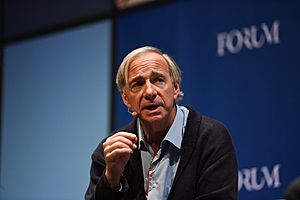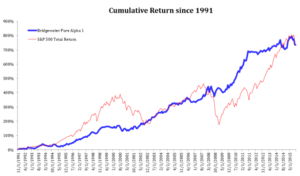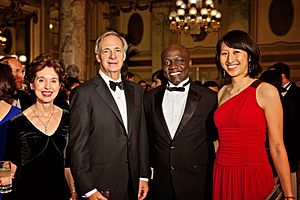Ray Dalio facts for kids
Quick facts for kids
Ray Dalio
|
|
|---|---|
 |
|
| Born |
Raymond Thomas Dalio
August 8, 1949 New York City, U.S.
|
| Education | Long Island University, Post (BS) Harvard University (MBA) |
| Occupation | Hedge fund manager |
| Known for | Founder of Bridgewater Associates |
| Spouse(s) | Barbara Dalio |
| Children | 4 sons, including Paul |
Raymond Thomas Dalio (born August 8, 1949) is an American billionaire. He is known for being a hedge fund manager. He has been a co-chief investment officer of Bridgewater Associates since 1985. He started Bridgewater in 1975 in New York City.
Dalio was born in New York City. He studied at C.W. Post College of Long Island University. He later earned an MBA from Harvard Business School in 1973.
In 2013, Bridgewater was named the largest hedge fund in the world.
Dalio wrote the 2017 book, Principles: Life & Work. This book shares his ideas on corporate management and investment philosophy. As of December 2024, Dalio was ranked #124 on Forbes' Richest People in the World. His net worth was estimated at $15.4 billion.
Contents
Early Life and Education
Dalio was born in the Jackson Heights area of Queens, New York City. When he was 8, his family moved to Manhasset on Long Island, New York. His father, Marino Dallolio, was a jazz musician. His mother, Ann, was a homemaker. Dalio has Italian family roots.
He went to Herricks High School.
He earned a bachelor's degree in finance from C.W. Post College. After college, Dalio worked as a clerk at the New York Stock Exchange.
He received his MBA from Harvard Business School in 1973.
Investment Career
While at Harvard, Dalio and his friends started a company. It aimed to trade commodities, but it did not do well. Dalio later used the name Bridgewater for his successful hedge fund.
After Harvard, Dalio moved to Wilton, Connecticut. He traded from a converted barn. He also worked on the New York Stock Exchange floor. He traded commodity futures. Later, he was the Director of Commodities at Dominick & Dominick LLC. In 1974, he became a futures trader at Shearson Hayden Stone. His job was to help farmers manage risks using futures.
Starting Bridgewater Associates
In 1975, Ray Dalio founded Bridgewater Associates. It began as a firm that advised businesses on their money. Many of its first clients came from Dalio's previous job. The company started publishing a research report called Daily Observations. This report analyzed global market trends.
Bridgewater's big success came when McDonald's became a client. After that, the company grew quickly. It gained larger clients, like the pension funds for the World Bank and Eastman Kodak. In 1981, Bridgewater opened an office in Westport, Connecticut. This was where Ray and his wife wanted to start their family.
Dalio became well-known after making a profit during the 1987 stock market crash. In 1991, he launched "Pure Alpha." This was a key strategy for Bridgewater. In 1996, Dalio started "All Weather." This fund used a steady, low-risk approach. It later became known as risk parity.
Growing Success
Bridgewater Associates became the world's largest hedge fund in 2005. In 2007, Bridgewater predicted the 2008 financial crisis. In 2008, Dalio wrote an essay. It was called "How the Economic Machine Works." It helped people understand different economies.
In 2011, Dalio published a book called Principles. It shared his ideas on investing and managing a company. In 2012, he was on the annual Time 100 list. This list names the 100 most influential people in the world. Bloomberg Markets also listed him as one of the 50 Most Influential people in 2011 and 2012.
The Teacher Retirement System of Texas bought a part of Bridgewater Associates in 2012. This was a $250 million investment. Dalio has led Bridgewater Associates with Bob Prince and Greg Jensen.
Dalio was co-CEO of Bridgewater for 10 months. In March 2017, he announced he would step down. This was part of a big change at the company.
Investment Ideas
Dalio describes Bridgewater Associates as a "global macro firm." This means it invests based on big economic trends. These trends include changes in money exchange rates, inflation, and economic growth. Dalio's main focus is on currency and bond markets.
Dalio also made the risk parity approach popular. He uses it to manage risk and spread out investments at Bridgewater Associates. In 2009, Dalio started using the term "d-process." This described the process of reducing debt and prices in the housing market. He later added this idea to his investment philosophy.
Views on Society
Capitalism and Fairness
Dalio believes that capitalism is generally the best economic system. However, he has said it needs to be improved. In July 2019, he called for changes to capitalism. He said that wealth inequality is a serious problem for the country. In May 2020, he emphasized that capitalism should be reformed, not abandoned.
China's Growth
In October 2020, Dalio advised people to notice China's rise. He argued that China has continued to become a global superpower.
His "Principles" Books
Dalio published Principles: Life & Work in 2017. It was a New York Times #1 bestseller. In 2019, he released an illustrated version called Principles for Success. In 2018, Dalio published Principles for Navigating Big Debt Crises. In 2021, he published Principles for Dealing with the Changing World Order. He also created a free online personality test called PrinciplesYou.
Personal Life
Family
Dalio lives with his wife, Barbara, in Greenwich, Connecticut. Barbara is related to the sculptor Gertrude Vanderbilt Whitney. They have four sons. Their oldest son, Devon, passed away in 2020 at age 42. Their second son, Paul Dalio (born 1979), is a film director.
Health
Dalio has had Barrett's esophagus. This is a condition related to gastroesophageal reflux disease (GERD). If not treated, it can sometimes lead to cancer.
Wealth
In 2014, reports said he earned $1.1 billion. This included fees from his firm and other awards. In 2015, Forbes estimated his net worth at $15.4 billion. This made him the second-richest hedge fund manager at the time. In 2018, Dalio reportedly received $2 billion in pay. This was after his fund had a 14.6% return. In March 2019, Forbes named Dalio one of the highest-earning hedge fund managers.
According to Forbes, Dalio's net worth was about $20 billion as of January 2022. This placed him 88th on their billionaires list. Bloomberg News reported his net worth as $15.7 billion in January 2022. This made him the world's 123rd-richest person by their rankings.
Giving Back
The Dalio family has given over $5 billion to their Dalio Foundation. The foundation has given out more than $1 billion in charity. In April 2011, Dalio and his wife joined the Giving Pledge. They promised to donate more than half of their wealth to charity during their lives.
Dalio has been on the board of trustees for NewYork–Presbyterian Hospital since 2020. In February 2020, the Dalio Foundation gave $10 million. This was to help China's recovery efforts during the COVID-19 pandemic. In March 2020, the foundation gave $4 million to Connecticut. This money helped fund healthcare and food programs. On October 13, 2020, NYP launched the Dalio Center for Health Justice with a $50 million gift.
The foundation has supported groups like Fund for Teachers and the David Lynch Foundation. It also supports the National Philanthropic Trust and TED's Audacious Project. Dalio's research yacht and submarine have been shown on the Discovery Channel. They have been used to search for giant squid. In 2018, OceanX, a Dalio family project, and Bloomberg Philanthropies promised $185 million over four years. This money helps protect the oceans. In 2019, he pledged $100 million to public schools in Connecticut.
Dalio has also supported the Volcker Alliance. This is a public policy group led by former Federal Reserve chair Paul Volcker.
Hobbies
Dalio practices Transcendental Meditation. He enjoys being outdoors. He has hunted cape buffalo, grouse, elk, and warthog. Dalio also likes bowhunting.
Published Works
- How the Economic Machine Works; A Template for Understanding What is Happening Now was Dalio's first book, published in 2007.
- Principles: Life & Work is Dalio's second book. Simon & Schuster published it in 2017. It was a New York Times #1 bestseller. CNBC listed Principles among the 13 Best Business Books of 2017.
- Principles for Navigating Big Debt Crises is Dalio's third book, published in 2018.
- The Changing World Order: Why Nations Succeed and Fail was published in 2021.
- How Countries Go Broke, Principles for Navigating the Big Debt Cycle, Where We Are Headed, and What We Should Do is planned for release in 2025.
See also
 In Spanish: Ray Dalio para niños
In Spanish: Ray Dalio para niños
 | Leon Lynch |
 | Milton P. Webster |
 | Ferdinand Smith |



